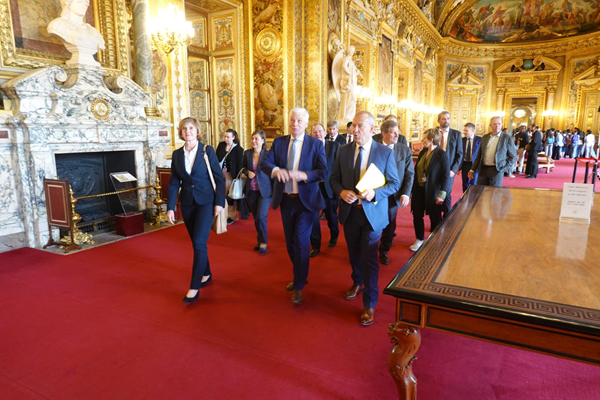 Luxembourg parliament visits French senate;
Credit: CHD
Luxembourg parliament visits French senate;
Credit: CHD
In its collaboration with other national parliaments, Luxembourg's parliament, the Chamber of Deputies, recently welcomed an official visit by the Deputy Prime Minister and Minister of Foreign and European Affairs of Slovenia on Monday 19 May 2025.
The Slovenian delegation led by Tanja Fajon was welcomed by the President of the Chamber of Deputies, Claude Wiseler, and Chair of the Committee on Foreign and European Affairs, Cooperation, Foreign Trade and the Greater Region, Gusty Graas.
The delegation held an exchange of views with members of the Bureau and members of the Committee on Foreign Affairs, Cooperation, Foreign Trade and the Greater Region.
the following day, Tuesday 20 May 2025, a Luxembourg delegation visited the French National Assembly and Senate, led by the President of the Chamber of Deputies, Claude Wiseler, accompanied by several members of parliament, including Fernand Etgen, Gusty Graas and Félix Eischen, bureau member Yves Cruchten, as well as the Luxembourg Ambassador to France, Marc Ungeheuer.
The agenda included a working lunch and discussions with Isabelle Rausch, President of the Friendship Group at the National Assembly, as well as with the President of the France-Belgium-Luxembourg Friendship Group in the Senate, Jean-François Husson, and the President Delegate for Luxembourg, Jean-Marie Mizzon.
The work lunch discussion began with an overview of the working conditions of French cross-border workers, with particular attention to the transportation situation, prospects for improvement, and their impact on employees' willingness to work in Luxembourg. Discussions also focused on ways to improve collaboration between France and Luxembourg regarding healthcare professionals.
Late in the afternoon, the Luxembourg delegation was received at the Senate by Senator Jean-François Husson, President of the France-Belgium and Luxembourg Friendship Group in the Senate, and Senator Jean-Marie Mizzon, Deputy President for Luxembourg. The topics of conversation were partly the same as those discussed during the exchange at the National Assembly, highlighting the importance of the issue of cross-border workers for the French interlocutors in the Luxembourg delegation.
The senators particularly felt that "cooperation between the two countries must be significantly strengthened" and that work needed to be done towards a truly shared living space in the border area. The medical desertification affecting France was also discussed. The French senators discussed the situation of doctors, as well as nursing assistants and personal care workers. Some expressed support for the establishment of joint cross-border training programs to create synergies in the medical field between the two countries.
Chamber President Claude Wiseler acknowledged the importance of French medical professionals to Luxembourg, particularly during the COVID crisis. He pledged to continue the dialogue and share his thoughts on the various topics discussed during the meetings during this visit to Paris with the relevant stakeholders, particularly within the government.
Other topics were discussed during the meeting, such as the future pension reform in Luxembourg and the assessment of free public transport, also in Luxembourg.
The Luxembourg delegation also attended the question-and-answer session during their visit.
Reporters Without Borders
They also met with Reporters Without Borders (RSF), during which they discussed a number of issues including levels of propaganda and interference, particularly from Russia, which was said to be "industrialising." They heard that appropriate measures must therefore be put in place to counter this phenomenon; the European framework would be essential, as would the establishment of a "democratic shield" to protect journalists. Another issued discussed was support for Russian media in exile.
Another issue discussed was the fate of Radio Free Europe (RFE): they heard that its existence is particularly threatened because the new US administration decided to withdraw its financial support. RFE would be an essential tool to counter the Kremlin's disinformation, RSF officials affirmed. Despite the Czech offer to contribute €2 million, the overall budget required is €150 million.
An additional point raised was the impact of the new ways young people are using to get their news, abandoning traditional media for social media, which do not allow for a "structured view" of the news.








